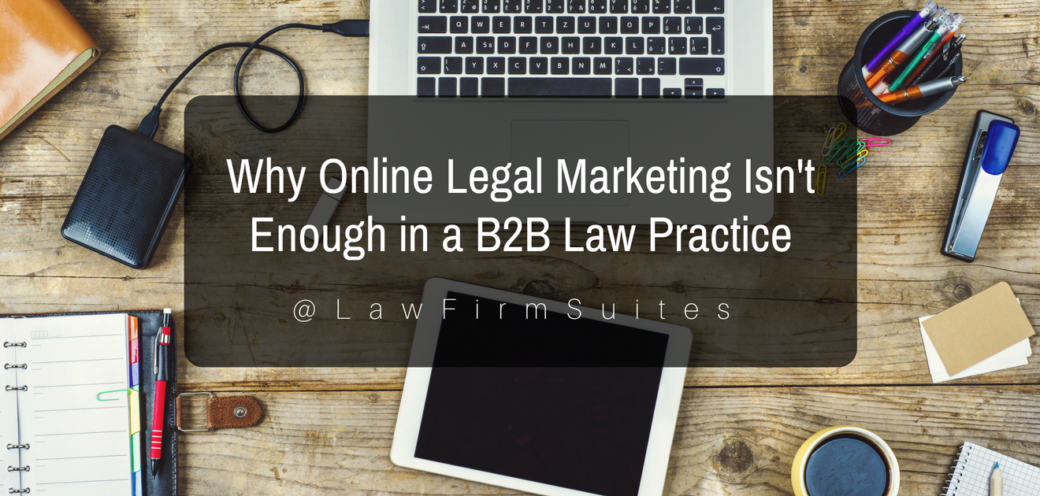For B2B law practices, relying solely on online marketing, or ignoring it altogether, is bad business.
The buying process for B2B clients has changed, and law firms that rely solely on offline marketing tactics, or online marketing, do so at their own peril.
The decision making process for B2B law clients looks less like a linear path, but more of a spiderweb of social influence and research channels, both online and off.
According to a study published in the McKinsey Quarterly, B2B clients regularly use an average of six channels to get the information they need to retain services, and that two thirds come away frustrated by inconsistent experiences.
Lawyers marketing to B2B clients need to focus on both offline and and online marketing techniques to get in front of prospective clients consistently.
B2B Legal Clients Value Endorsements from Peers (Online and Off)
Approximately 67 percent of a B2B client’s “buyer journey” is done digitally and 50 to 80 percent is completed before ever contacting a lawyer.
But this means that one-third of the B2B client’s buying process is done offline, and much of that is done during the early and late stages of the decision making process.
Business clients are naturally more particular when making hiring decisions for services that can heavily influence the future of their companies, which is why the endorsement of a trusted peer is more valuable in the late stages of the buying process than unsubstantiated online sales puffery.
While this validation has historically, and is still frequently, conducted through offline interactions, roughly 22% of all B2B buyers seek these recommendations through their online social media networks.
Cultivating Evangelists is Critical to Success
An “evangelist” is just a new word used by the marketing community for a solid referral source. Evangelists are people who can say, “Yes, she’s the real deal, and she knows what she is doing. I’ve worked with her.”
The cultivation of evangelists is largely an offline activity, and something lawyers have been doing it for years. Developing a “word of mouth” endorsement is no exact science, but there are things you can do to influence it.
Carefully manage and maintain your reputation with your attorney peers. The basic rules of networking apply. You have to give before you get, and it helps if you’ve learned the proper etiquette for sending and receiving referrals.
Also, focus on monitoring client satisfaction and accepting and acting on negative feedback. This will be easier if you maintain a system to stay in touch with former clients to encourage evangelism.
For example, contact former clients and referral sources by email with a content offer. The contacts who open and click the email are the often ones who will evangelize for your firm. Focus your development efforts on those contacts first.
Offline Activities Should Influence Online Marketing
Potential clients may engage with your firm both online and off. So your marketing message should be consistent on both platforms to avoid brand confusion.
Your offline marketing activities like speaking engagements, charitable activities or board memberships are easy sources of new online content (video clips, photos, blog articles). New content improves your firm’s website and keeps it fresh.
Use online tools like social media and blogging to enhance and promote your offline marketing efforts. By doing so, you build on a strong foundation and offer the gravitas that the B2B law client demands before committing to a retainer.
It is worth your time to develop a workable social media strategy, particularly on LinkedIn, which generates 80 percent of all B2B leads from social media.
A Blend of Online and Offline Marketing Works Best
Having a defined strategy to market to prospective clients both online and off will ensure that you are engaging them through multiple channels.
Interacting with decision makers throughout the buyer’s journey with educational resources, peer recommendations and decision making advice will help simplify the journey. As a result, you will position your practice as trustworthy and competent, creating loyal customers and evangelists.



